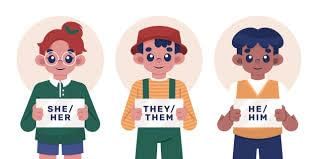Year 6 Exam > Year 6 Notes > Year 6 English > Pronoun
Pronoun | Year 6 English PDF Download
Understanding Pronouns
- A pronoun serves as a replacement for a noun in a sentence. Nouns are words that indicate objects, places, or people.
- Pronouns are concise words like 'it', 'she', 'he', 'you', 'we', 'they', 'us', and 'them'.
- They are utilized to refer to individuals or groups without repeating their names, enhancing sentence clarity.
- Without pronouns, sentences can become cumbersome and repetitive. For instance:
- "Tom went upstairs to the bedroom. Tom opened the door and Tom sat on the bed."
- This repetition can be avoided by using pronouns effectively.

Function of Pronouns
- Pronouns replace nouns to prevent redundancy and maintain fluidity in communication.
- They aid in avoiding monotony in language and enhance the readability of sentences.
Types of Pronouns
- Personal Pronouns: Refer to specific people or things (e.g., he, she, it).
- Possessive Pronouns: Indicate possession (e.g., his, her, its).
- Reflexive Pronouns: Reflect the action of the subject back to itself (e.g., myself, yourself).
- Demonstrative Pronouns: Point to specific things (e.g., this, that).
Benefits of Pronouns
- Pronouns facilitate smoother communication by eliminating repetitive use of nouns.
- They enhance sentence structure and overall readability.
Personal Pronouns
- I: Used to refer to oneself
- She: Refers to a female person
- He: Refers to a male person
- You: Refers to the person being spoken to
- We: Refers to a group including oneself
- Us: Refers to a group excluding oneself
- Them: Refers to a group of people
Personal pronouns are small words that replace names. For instance, instead of saying "Anita charged towards the dragon," you can say "She charged towards the dragon," replacing 'Anita' with 'she'.
Question for PronounTry yourself: Which type of pronoun is used to indicate possession?View Solution
Possessive Pronouns
- Mine: Shows ownership
- Ours: Shows ownership by a group
- Yours: Shows ownership to the person being spoken to
- His-Hers: Shows ownership by a male or female respectively
- Theirs: Shows ownership by a group
Possessive pronouns indicate possession. For example, instead of saying "That hat is Ben’s," you can say "That hat is his," replacing 'Ben’s' with 'his'.
The document Pronoun | Year 6 English is a part of the Year 6 Course Year 6 English.
All you need of Year 6 at this link: Year 6
|
26 videos|58 docs|10 tests
|
FAQs on Pronoun - Year 6 English
1. What are personal pronouns? $#
Ans. Personal pronouns are words that are used to replace nouns in a sentence, such as "he," "she," "it," "we," and "they."
2. Can you provide examples of possessive pronouns? $#
Ans. Some examples of possessive pronouns include "mine," "yours," "his," "hers," "ours," and "theirs."
3. How are personal pronouns different from possessive pronouns? $#
Ans. Personal pronouns are used to replace nouns, while possessive pronouns show ownership or possession of something.
4. Why are pronouns important in English grammar? $#
Ans. Pronouns help to make sentences less repetitive and more concise by replacing nouns. They also help to avoid confusion in writing.
5. How can I improve my understanding of pronouns in English? $#
Ans. You can improve your understanding of pronouns by practicing using them in sentences, reading and writing regularly, and seeking help from grammar resources or teachers.
Ans. Personal pronouns are words that are used to replace nouns in a sentence, such as "he," "she," "it," "we," and "they."
2. Can you provide examples of possessive pronouns? $#
Ans. Some examples of possessive pronouns include "mine," "yours," "his," "hers," "ours," and "theirs."
3. How are personal pronouns different from possessive pronouns? $#
Ans. Personal pronouns are used to replace nouns, while possessive pronouns show ownership or possession of something.
4. Why are pronouns important in English grammar? $#
Ans. Pronouns help to make sentences less repetitive and more concise by replacing nouns. They also help to avoid confusion in writing.
5. How can I improve my understanding of pronouns in English? $#
Ans. You can improve your understanding of pronouns by practicing using them in sentences, reading and writing regularly, and seeking help from grammar resources or teachers.
Related Searches





















